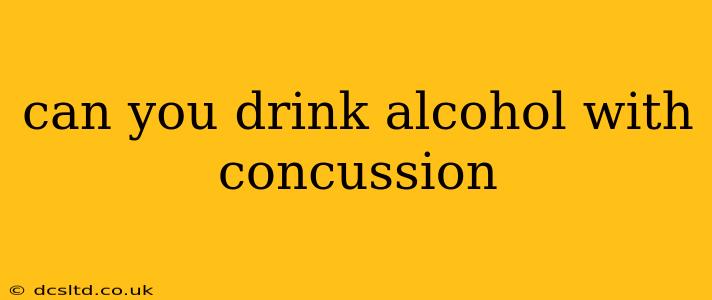A concussion, also known as a mild traumatic brain injury (mTBI), is a serious injury that requires careful management. One of the most frequently asked questions surrounding concussion recovery is whether or not alcohol consumption is permissible. The short answer is a resounding no. Alcohol and concussion are a dangerous combination, and consuming alcohol after a concussion can significantly hinder the healing process and potentially worsen the injury.
This guide will explore the reasons why alcohol should be strictly avoided after a concussion, addressing common questions and concerns.
Why Should You Avoid Alcohol After a Concussion?
Alcohol is a central nervous system depressant. This means it slows down brain function. After a concussion, your brain is already vulnerable and working hard to repair itself. Adding alcohol into the mix puts an extra strain on the brain, potentially delaying recovery and increasing the risk of complications.
Here's a breakdown of the negative impacts:
-
Increased Inflammation: Alcohol can increase inflammation in the brain, exacerbating the already present inflammation caused by the concussion. This increased inflammation can prolong healing time and potentially lead to more severe long-term effects.
-
Impaired Healing: The brain needs time and resources to heal after a concussion. Alcohol interferes with this process by disrupting the body's natural repair mechanisms. This can lead to prolonged symptoms and a slower recovery.
-
Increased Risk of Bleeding: In some cases of concussion, there might be small bleeds within the brain. Alcohol can increase the risk of further bleeding and exacerbate the damage.
-
Exacerbated Symptoms: Alcohol can worsen common concussion symptoms such as headaches, dizziness, nausea, and cognitive difficulties. This can make daily life significantly more challenging during the recovery period.
How Long Should You Avoid Alcohol After a Concussion?
There's no one-size-fits-all answer to this question. The duration of alcohol abstinence depends on the severity of the concussion and the individual's recovery progress. It's crucial to follow the advice of your doctor or other healthcare professional. They will assess your specific situation and provide personalized recommendations regarding alcohol consumption. In many cases, complete abstinence is recommended for several weeks, or even months, post-injury.
What About Other Substances?
Similar to alcohol, other substances like recreational drugs should also be avoided after a concussion. These substances can further compromise brain function and delay recovery. Maintaining a healthy lifestyle, including adequate rest and a balanced diet, is essential for optimal recovery.
What Are the Long-Term Effects of Drinking Alcohol After a Concussion?
Consuming alcohol after a concussion can increase the risk of long-term complications, including:
-
Post-concussion syndrome (PCS): This condition involves persistent symptoms that last for weeks, months, or even years after the initial injury.
-
Chronic traumatic encephalopathy (CTE): While more common in individuals with repeated head trauma, alcohol consumption could potentially exacerbate the risk of CTE.
-
Cognitive impairments: Difficulties with memory, concentration, and executive function can be prolonged or worsened by alcohol consumption.
Can I Drink Alcohol If I Feel Better After a Concussion?
Even if you feel like you've fully recovered, it's still crucial to follow your doctor's advice regarding alcohol consumption. Many concussion symptoms are subtle and might not be immediately apparent. Drinking alcohol before you're fully healed could mask symptoms and delay proper diagnosis and treatment.
When Can I Resume Normal Activities, Including Social Situations Involving Alcohol?
The return to normal activities, including social situations where alcohol might be present, should be guided by your healthcare provider. They will assess your progress and help determine when it's safe to gradually reintroduce these activities into your life.
In conclusion, avoiding alcohol after a concussion is non-negotiable for safe and effective recovery. Prioritize your brain health and follow your doctor's recommendations to ensure a complete and healthy recovery. Your well-being is paramount.
